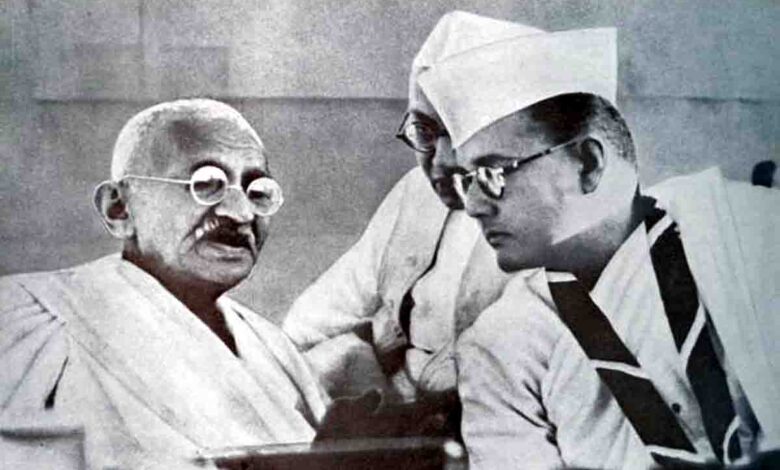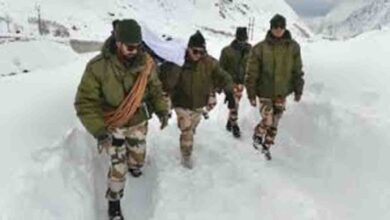Subhas Chandra Bose at Tripuri: Victim of non-violent violence?

VIEWPOINT
 Romit Bagchi
Romit Bagchi
“At the last Congress session, some rude hands have deeply hurt Bengal with an ungracious persistence. Please apply without delay a balm to the wound with your own kind hands and prevent it from festering,” Rabindranath Tagore wrote to Mahatma Gandhi on March 29 1939, urging the latter’s kind intervention to end Subhas Chandra Bose’s predicament inside the Congress, post- his astounding election to the party’s presidentship for the Tripuri session in the teeth of stiff opposition from the staunch Gandhiites. However, Gandhi (the title ‘Mahatma’ was given to him by Tagore) refused to mellow. He wrote back, “I have your letter full of tenderness. The problem you set before me is difficult. I have made certain suggestions to Subhas. I see no other way out of the impasse.”
The Gandhi-Subhas head-on confrontation in the aftermath of the latter’s victory for Tripuri is doubtless one of the most exciting and tense phases in the history of the party since its Surat split. Now, let us look back on what happened before and after the election.
Sensing the impending danger to his undisputed supremacy over the Congress with Bose remaining iron-willed to contest the presidential election for the second consecutive term, Gandhi proposed the name of Jawaharlal Nehru to take on Bose. It was a shrewd move aimed at driving a wedge between the two ideologically fellow travellers. Nehru refused and named Maulana Azad instead. Azad proposed the name of Pattabhi Sitaramyaya. It is intriguing why they made him the candidate though he was a lightweight behind the redoubtable Bose who had already emerged as the uncompromising anti-Gandhi face.
When Bose was preparing to wrest the control of the Congress from the Old Guard which, according to him, was vegetating when the world was staring at a grim crisis with the clouds of the Second World War hovering across, the true-blue Gandhiites led by Sardar Patel conceived a move to scuttle his plan. They said that as the presidential election had been a unanimous affair so far a contest was undesirable. While lending support to Sitaramyaya they pressured Bose to withdraw. The historians said that this move had Gandhi’s full support.
Exasperated, Bose said that Patel and other Gandhi acolytes were nastily conspiring against him. Nehru wrote to Bose, asking him to not doubt the bona fides of his colleagues. Gandhi supported none of the candidates but remarked that anarchy was awaiting the country.
The election was held amidst this vitiated atmosphere and Bose defeated Sitaramyaya by 1580-1375 votes. Stunned, Gandhi famously said that it was more his defeat than Sitaramyaya’s. He further said that he was happy with Bose’s victory and he was now free to form his own team and implement his policies. “After all, Subhas Babu is not an enemy of the country. He has suffered for it…Those who feel uncomfortable in being in the Congress may come out, not in a spirit of ill-will but with the deliberate purpose of rendering more effective service.” The historian Amalesh Tripathi wondered what could be a deadlier challenge couched in a gentle language.
A few days before the Tripuri Congress, Gandhi intriguingly went to Rajkot and got deeply involved in a dispute with the Princely States. As a prelude to the session, a Congress Working Committee meeting was slated at Wardha. Bose requested its deferment, citing his serious illness. Meanwhile, to mount pressure on Bose, 12 out of 15 CWC members, including Patel, Rajendra Prasad and Govind Ballabh Pant, resigned. Later, Nehru followed suit. In another move meant to coerce Bose into submission, Pant introduced a resolution at the CWC meeting, asking Bose to form the next CWC in accordance with Gandhi’s wishes, a move that amounted to an explicit expression of no-confidence in the newly elected president.
The open session at Tripuri was held on March 10, 1939. Burning with fever, Bose came. His speech was read by his elder brother Sarat Chandra Bose. The speech focused itself on issuing an ultimatum to the British government, stating that it must address the country’s demands in view of the deepening international crisis failing which there would be a full-blooded people’s movement to oust the government. The fuming Old Guard cast doubt on Bose’s illness which triggered an acrimonious uproar. To further push Bose back to the wall, they got the Pant resolution approved. Bose’s wings were clipped. Defeated and humiliated, he left Tripuri.
Later, Bose made repeated and desperate attempts to mend fences with Gandhi. He put a proposal for a composite committee that would include his followers and members of the Old Guard. But Gandhi remained unyielding.
Then the inevitable happened at the AICC session in Calcutta. Hemmed in by hostility, Bose offered to resign. He said it was not possible for him to form his team in accordance with the Pant resolution and he would feel uncomfortable in the team if the AICC formed it. Nehru requested him to not resign and proposed a compromise which Bose declined. Then Sarojini Naidu who was chairing the session asked Bose to clarify his offer to resign. Bose said it depended on the AICC’s decision about his composite team proposal. Naidu then accepted Bose’s resignation hastily sans vote and appointed Rajendra Prasad as the next president. All hell broke loose thereafter and the members of the Old Guard fled to escape the wrath of the mob comprising Bose’s followers. The final act came up a few days later when the new CWC expelled Bose, debarring him from any elected post for three years. Further, to rub salt into his wound, Prasad dissolved the Bengal Congress Committee, provoking Bose to an open rebellion. Gandhi commented sarcastically: “I could understand rebellion after secession.”
This is a brief account of what happened. But the question is: why Gandhi was so implacably and uncharacteristically bellicose to Bose. Historian Amalesh Tripathi gave a plausible reason though he emphatically said that its authenticity was not verified. The senior Congress leader from Bombay K M Munshi is supposed to have told Ashok Majumdar, the son of the eminent historian Ramesh Chandra Majumdar, that Bose while in Bombay used to meet the German Consular at a friend’s home in disguise. The British intelligence department learnt about it and Munshi who was then the finance minister of the Bombay State was informed. According to Tripathi, he might have told Gandhi. Gandhi kept it to himself and did not disclose it to his close lieutenants like Nehru and Patel as he knew that Bose would have reacted furiously had the information been incorrect. Nevertheless, it might have created a doubt in Gandhi’s mind and he might have thought that if Bose was allowed to gain control he would have directed the party into a direction that would have been an anathema to Gandhi, given the Nazi pogrom and other inhumane acts.






